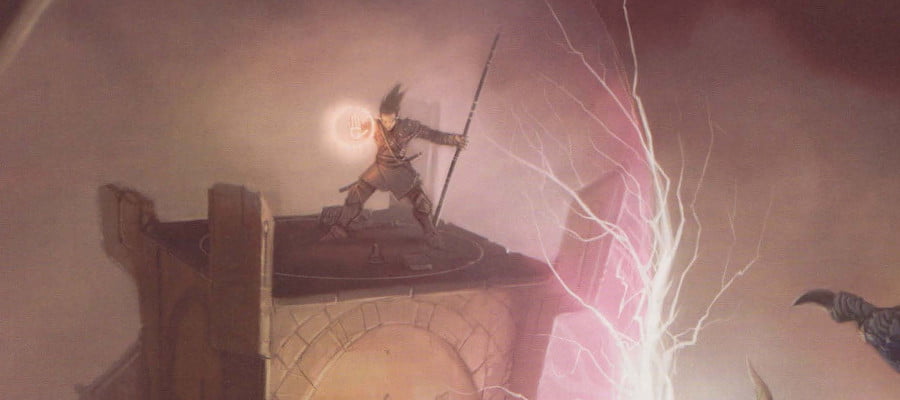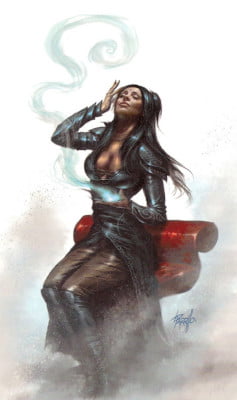It’s a well-worn meme that in the context of the Dungeons And Dragons moral framework, that Warlocks and Paladins are different only in that one has an employer, and one has a sugar daddy. Notably, before you giggle too much, recognise that of the two, the Warlock’s the one with a contract, but the Paladin’s the one with a code of conduct.
No, don’t worry, this isn’t going to be a treatise on how the Warlock in 4th edition has balance problems, or how they have probably one of the most stolen powers in the game, or how the Paladin does most of what I want a Warlock to do, no no. Not even bringing up that the divine characters have their power sources expanded with personalities and ideologies and characterisation and all that, while the Warlock gets maybe try elementals? I’m not bitter.
This is about being a Warlock in 4th edition.
Content Warning: I talk about drugs a little bit, in broad and general terms!
First of all, in 4th edition, Warlock Power can stem from a number of possible sources, with different mechanical flavour. Not all sources are created equally, of course; some of them are malnourished little mechanical packages, released in some book that wasn’t successful enough to get follow-ups, like the Drow Dark Pact, or the Arrakis-based Elemental Pact, but others had enough thematic space and an interesting enough mechanical hook that they got developed across the whole edition’s lifetime.
These sources are framed with something of a euphemistic wording, and you can definitely use them for different ideas, but broadly they come in the classic flavours of Fey Pact (The Fair Folk), Infernal Pact (Demons), Sorcerer Kings (Racism), Star Pact (Lovecraftian Horrors), Vestige Pact (Dead Dreams) and Everything Else (Cool Ranch).
What’s more, this power is never retracted, not really. There’s nothing in the game rules for a warlock losing access to power, because obviously, that represents a nightmare for balance decisions. If players can lose power because of social choices or the whims of some fancy NPC then the entire combat model the narrative engine turns to as a failure state can break in a sort of backflow problem. It’s not that D&D is a combat engine per se, but that when every other option is exhausted, 4e’s failure state is ‘Go To Combat.’
What this means is that Warlocks are characters who have power from an untrustworthy source but the philosophy of what that means is entirely up to the player to express, not to the DM to wield as some variety of player incentive. I have written about this in the past, where the availability of falling-and-redemption mechanics create the impression that players are going to do it, and therefore, codes of conduct are a player trap waiting to be sprung at an appropriate moment for some XP like a legal puzzle.
But that’s about what if the DM decides to dick you over for drama.
Not, how do you express your character being in a constant state of dicked-overness already?
See, when you make a Warlock, something you might notice is Diplomacy is absent. Warlocks are not expected to be good faith operators in the negotiation space; not that you can’t do something to address that, like some kind of cool multiclass feat, but by default, the Warlock’s social toolset is limited to intimidation (which indicates threat, not good faith exchange) and Streetwise (which indicates deceit). Basically, Warlocks are not equipped out of the gate to be capable of fair negotiations of power and consent. That means that you can kind of just assume that idea isn’t available; all Warlock power is at best stolen. On the other hand, every pact is connected power-wise to some total pricks, and I don’t think it’s a bad thing to steal from billionaires magic billionaires powerful magic forces.
In 4th edition a lot of these details about how your character works are left up to the player to choose and express how they want in the fictional space; the game engine wants to make sure combat works predictably and fairly but it’s okay with players taking all sorts of range to express what that means. This leads to the paradigm I was first explained as Your Thematics Are Your Own, but which I now think of as All Is Vibes. The vibe of your Warlock sets the scene for how you relate to your patron, and from there you get to fine tune your choices.
I therefore propose the following H-words list for ideas for expressing your Warlock’s relationship to their pact.
Hunted
You took something and now you know someone is going to want to get it back. This works great for pacts that are inhuman and uncaring – Star and Fey Pacts both have themes that play into things who relate to stuff but also don’t relate to stuff that makes sense to us. A shard of the Far Realms could be as important a stolen power font as a rose from a particularly nice garden that now grows out of your eye.
You don’t want to stay still. You don’t want to be connected to people like you. You want maybe to do some research but you’re very untrustworthy of who wants to know why. Anyone could be a clue that leads to you. Of course, you wind up trusting the party members and maybe wind up kissing the Paladin. Or don’t, I’m not in charge here.
Haunted
You don’t know why you can do this. You know something happened, something wrong; it’s got something tied to trauma, but while there’s a crack in you, that’s the crack where the light gets in. This works really well in my opinion for the Vestige Pacts, where those are things with identity that are trying to find some way to continue to live. There’s also, if you want to play with some narrative fire, the Sorcerer-King Pact, where you’re tying yourself to a racist, colonialist, slaveholding past, and trying to find out what you should be doing with The Master’s Hammer.
Hubris
Of course you can handle it.
Huckster
Of course you can handle it, or at least, that’s what you make sure everyone is thinking. Your powers are stupendous! Amazing! Preposterous! Behold as you levitate this cow! The whole point is the performance. If you’re noticed, if you’re publically recognised, then the fact that part of you, part of what makes you you, is slowly bleeding away into that… thing is going to make it easier to check who you are, why you exist, that you exist.
I like this a lot, the heavily performative, goofy Warlock, as tied to fey pacts, because they’re great for the idea of the story for its own sake. Fey storytelling can often be about morals and messages or just ‘the way the story goes’ (which is also about ideology and morals and messages but whatever), and therefore you can wind up trapped in a narrative loop. You could be Carnivale, complete with the No Ending.
Hunter (S Thompson)
When confronting a world full of horrors and feeling power drip through your veins whose source you know full well you shouldn’t even be looking at let alone tapping to make the world take a new shape under your guidance, there are a lot of things people can turn to. Some turn to ideology. Some turn to superstition. You turn to getting constantly blitzed.
I do have one last option, which I just want to suggest for people who like the idea of having a relationship to your power and a goal but don’t like the idea that ‘taking power from the powerful can only be a hopeless and helpless task that destroys you.’
What I’d like to suggest is a simple, two word idea for you to take into the world of your story: Unionise Warlocks.
This article was reposted from Talen’s personal blog.
You can find the original at Press.exe



